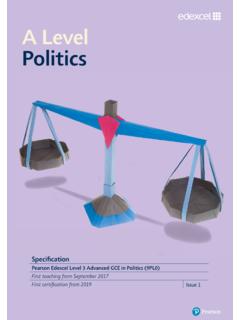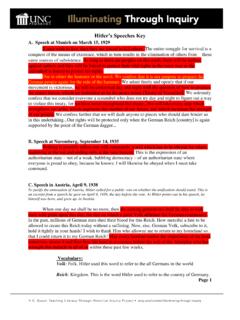Transcription of Democracy: Its Meaning and Dissenting Opinions of the ...
1 Journal of Education and Practice ISSN 2222-1735 (Paper) ISSN 2222-288X (Online) , , 2015 131 democracy : Its Meaning and Dissenting Opinions of the Political Class in Nigeria: A Philosophical Approach Nwogu, ; Department of Educational Foundations Rivers State University of Science and Technology, Nkpolu-Oroworukwo, Port Harcourt ABSTRACT The nascent democracy in Nigeria is plagued with myriad of intrigues, discordant Opinions of the political class.
2 The reason is not farfetched. Every political party sees its manifesto and plans of action as the best for the citizenry. They elbow each other in the process of garnering political recognition and vibrancy. Their unhealthy rivalry only heat up the polity. How be it some Nigerians see these political dissent as a necessary tool to a sound democratic process. They argue that Dissenting voices amongst the political class are necessary since a democratic process would never be devoid of antagonism and democracy would never thrive on rational consensus.
3 This paper seeks to define democracy , explore the Dissenting Opinions of the political class which many say attempt to make or mar the democratic process in Nigeria. The study would further examine the role of the media in fast tracking the entire democratization process with a view to ascertaining whether the practice of democracy in Nigeria is in tandem with acceptable practices in the well recognized democracies of the world. Finally, the paper would proffer possible solutions and make necessary recommendations that would help deepen true democratic culture in Nigeria.
4 Key words, democracy , politics, dissent, mass media, democratization process. The Concept of democracy It is difficult to reach a consensus on the definition of democracy . However, the main idea of democracy is widely accepted to have originated from Athens in the 5th century BC. The Webster New Encyclopaedic Dictionary (1995) defines democracy as a government in which supreme power is invested in the people and exercised by them directly or indirectly through representation. According to Lindell, and Scott (1999), the term originates from the Greek word (demokratia) rule of the people which was coined from (demos) people and (kratos) power or rule in the 5th century It is important to note that the political system postulated by the Athenians was such that democratic citizenship was exclusive to an elite class of free men only.
5 Slaves and women were excluded from participation. In a lecture titled What is democracy ? Larry Diamond (2004) gave an overview of what in his opinion is democracy . He describes democracy as a system of government with four key elements: i) A system for choosing and replacing the government through free and fair elections; ii) Active participation of the people, as citizens, in politics and civic life; iii) Protection of the human rights of all citizens; and iv) A rule of law in which the laws and procedures apply equally to all citizens.
6 Popper as cited in Javie (2006) defines democracy in contrast to dictatorship or tyranny. He places emphasis on the availability of opportunities for the people to control their leaders and to them without recourse to a revolution. Popper s view must have hinged on the fact that there are many variants of democracy today. The most dominant variable is what he terms the direct democracy in which all citizens of a country are given direct and active participation in the decision making process of their countries.
7 Another variant is the representative democracy in which the whole body of all eligible citizens remain the sovereign power but political power is exercised indirectly through elected representatives. According to Encyclopaedia Britanica, the concept of representative democracy arose largely from ideas developed during the Middle Ages, the Reformation, the Age of Enlightenment and the American and French Revolutions. Dahl, Shapiro, Cheibib (2003) state that in a representative democracy , every vote has equal weight, no unreasonable restrictions can apply to anyone seeking to become a representative, and the freedom of its eligible Journal of Education and Practice ISSN 2222-1735 (Paper) ISSN 2222-288X (Online)
8 , , 2015 132 citizens is secured by legitimized rights and liberties which are typically protected by a constitution. An offshoot of this variant is the Westminister system as practiced in the United Kingdom, with a sovereign monarch, parliamentary participation and a judicial independence. This is totally different from the democracy practised in United States of America which practises separation of powers between three arms of government: the executive, the legislative and the judiciary.
9 A common characteristic of all the variants of democracies discussed above is that representative democracy allows competitive elections which promote equality among all eligible citizens in all respects, and also ensures that the rules of all elections are clear, set out in advance, and do not privilege any group or individual over another. In furtherance of this, Kelsen (1955) and Barak (2006), assert that representative democracy which allows freedom of political expression, freedom of speech and freedom of the press are considered to be the essential rights that allow eligible citizens to be adequately informed and able to vote according to their own interests.
10 From the foregoing, one can conclude that the basic feature of democracy according to Nassbaum (2000) is the capacity of all voters to participate freely and fully in the life of their society, and that democracy is a form of government in which all eligible citizens have an equal say in law-making (Diamond, 2006). It might be necessary, at this stage to highlight another key word in our quest to discuss democracy . This is simply the concept of politics. The Concept of Politics The term politics is derived from the Greek word polis a city state (Nwogu, 2001).











